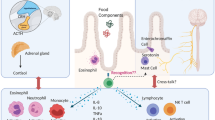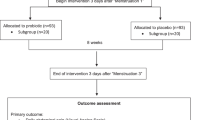Abstract
Gastrointestinal symptoms are common complaints during pregnancy and are generally of mild intensity. Nausea and vomiting and related repulsion toward foods in the first trimester of pregnancy might represent also an intricate evolutionary protective mechanism, an adaptation to protect the embryo from phytotoxins and other environmental hazards. Indeed, 20–30 % of the adult population in the USA and Europe suffer from adverse reactions to food, and only in one out of ten cases these reactions are caused by IgE-mediated allergic mechanisms; all other forms are broadly considered food antigen hypersensitivity. The percentage of women who experience heartburn symptoms, at any time during pregnancy, range from 30 to 80 %, being highest in the third trimester. These symptoms should encourage changes as regards composition of meals (check for food hypersensitivity), time from meal to bedtime, moderate exercise after eating, supported by short therapies with alginate-based formulations. Constipation in pregnant women is the most underreported disturbance during the second and third trimester commonly interpreted as a simple progesterone-related symptom. Indeed, fiber intake is usually well below the standard recommendations in the daily health plate and thus is frequently forgotten by healthcare providers. The lack of prebiotics and hydrophilic fibers is frequently associated with subclinical inflammatory bowel disease thus translating a latent dysfunction into a clinical symptom. During pregnancy it may be difficult to assess if a specific symptom is an expression of a gastrointestinal disease or if it is caused by the pregnancy itself that simply adds on the preexisting subclinical gastrointestinal abnormalities. The aim of every healthcare provider is to identify gastrointestinal symptoms during pregnancy, refuse the idea that all of them are simple “normal” side effects of being pregnant, and, through them, identify prepregnancy subclinical conditions and to address the best treatment options, focusing particularly on nutritional mechanisms.
Access this chapter
Tax calculation will be finalised at checkout
Purchases are for personal use only
Similar content being viewed by others
References
Sartorelli DS, Barbieri P, Perdona GC. Fried food intake estimated by the multiple source method is associated with gestational weight gain. Nutr Res. 2014;34(8):667–73.
Mathews F, Yudkin P, Neil A. Influence of maternal nutrition on outcome of pregnancy: prospective cohort study. BMJ. 1999;319(7206):339–43.
Arentson-Lantz EJ, et al. Excess pregnancy weight gain leads to early indications of metabolic syndrome in a swine model of fetal programming. Nutr Res. 2014;34(3):241–9.
Alkerwi A, et al. No significant independent relationships with cardiometabolic biomarkers were detected in the Observation of Cardiovascular Risk Factors in Luxembourg study population. Nutr Res. 2014;34(12):1058–65.
McGaughy JA, et al. Prenatal malnutrition leads to deficits in attentional set shifting and decreases metabolic activity in prefrontal subregions that control executive function. Dev Neurosci. 2014;36(6):532–41.
Salam RA, Das JK, Bhutta ZA. Multiple micronutrient supplementation during pregnancy and lactation in low-to-middle-income developing country settings: impact on pregnancy outcomes. Ann Nutr Metab. 2014;65(1):4–12.
Triunfo S, Lanzone A. Impact of overweight and obesity on obstetric outcomes. J Endocrinol Invest. 2014;37(4):323–9.
Baron TH, Ramirez B, Richter JE. Gastrointestinal motility disorders during pregnancy. Ann Intern Med. 1993;118(5):366–75.
Goodwin TM. Nausea and vomiting of pregnancy: an obstetric syndrome. Am J Obstet Gynecol. 2002;186(5 Suppl Understanding):S184–9.
Jarvis S, Nelson-Piercy C. Management of nausea and vomiting in pregnancy. BMJ. 2011;342:d3606.
Keller J, Frederking D, Layer P. The spectrum and treatment of gastrointestinal disorders during pregnancy. Nat Clin Pract Gastroenterol Hepatol. 2008;5(8):430–43.
Knudsen A, Lebech M, Hansen M. Upper gastrointestinal symptoms in the third trimester of the normal pregnancy. Eur J Obstet Gynecol Reprod Biol. 1995;60(1):29–33.
Koch KL. Gastrointestinal factors in nausea and vomiting of pregnancy. Am J Obstet Gynecol. 2002;186(5 Suppl Understanding):S198–203.
McCarthy FP, Lutomski JE, Greene RA. Hyperemesis gravidarum: current perspectives. Int J Womens Health. 2014;6:719–25.
Sanu O, Lamont RF. Hyperemesis gravidarum: pathogenesis and the use of antiemetic agents. Expert Opin Pharmacother. 2011;12(5):737–48.
Matthews A, et al. Interventions for nausea and vomiting in early pregnancy. Cochrane Database Syst Rev. 2014;(3):CD007575.
van der Woude CJ, Metselaar HJ, Danese S. Management of gastrointestinal and liver diseases during pregnancy. Gut. 2014;63(6):1014–23.
Hovdenak N, Haram K. Influence of mineral and vitamin supplements on pregnancy outcome. Eur J Obstet Gynecol Reprod Biol. 2012;164(2):127–32.
Boregowda G, Shehata HA. Gastrointestinal and liver disease in pregnancy. Best Pract Res Clin Obstet Gynaecol. 2013;27(6):835–53.
Tsuruta E, et al. Pathogenic role of asialo human chorionic gonadotropin in gestational thyrotoxicosis. J Clin Endocrinol Metab. 1995;80(2):350–5.
Lagiou P, et al. Nausea and vomiting in pregnancy in relation to prolactin, estrogens, and progesterone: a prospective study. Obstet Gynecol. 2003;101(4):639–44.
Sandven I, et al. Helicobacter pylori infection and hyperemesis gravidarum: a systematic review and meta-analysis of case-control studies. Acta Obstet Gynecol Scand. 2009;88(11):1190–200.
Sugito Y, et al. Relationship between severity of hyperemesis gravidarum and fetal DNA concentration in maternal plasma. Clin Chem. 2003;49(10):1667–9.
Cardwell MS. Pregnancy sickness: a biopsychological perspective. Obstet Gynecol Surv. 2012;67(10):645–52.
Bischoff SC, Renzer C. Nausea and nutrition. Auton Neurosci. 2006;129(1–2):22–7.
Griffiths RR, et al. Low-dose caffeine discrimination in humans. J Pharmacol Exp Ther. 1990;252(3):970–8.
De Francisci G, Parisi N, Magalini SI. The Chinese restaurant syndrome. Recenti Prog Med. 1981;70(4):353–7.
Garcia-Falcon MS, Simal-Gandara J, Carril-Gonzalez-Barros ST. Analysis of benzo[a]pyrene in spiked fatty foods by second derivative synchronous spectrofluorimetry after microwave-assisted treatment of samples. Food Addit Contam. 2000;17(12):957–64.
Pereira B, et al. Prevalence of sensitization to food allergens, reported adverse reaction to foods, food avoidance, and food hypersensitivity among teenagers. J Allergy Clin Immunol. 2005;116(4):884–92.
Richter JE. Gastroesophageal reflux disease during pregnancy. Gastroenterol Clin North Am. 2003;32(1):235–61.
Welsh T, et al. Prostaglandin H2 synthase-1 and −2 expression in guinea pig gestational tissues during late pregnancy and parturition. J Physiol. 2005;569(Pt 3):903–12.
Moayyedi P, et al. Helicobacter pylori eradication does not exacerbate reflux symptoms in gastroesophageal reflux disease. Gastroenterology. 2001;121(5):1120–6.
Cardaropoli S, Rolfo A, Todros T. Helicobacter pylori and pregnancy-related disorders. World J Gastroenterol. 2014;20(3):654–64.
Quartarone G. Gastroesophageal reflux in pregnancy: a systematic review on the benefit of raft forming agents. Minerva Ginecol. 2013;65(5):541–9.
Magee LA, et al. Safety of first trimester exposure to histamine H2 blockers. A prospective cohort study. Dig Dis Sci. 1996;41(6):1145–9.
Gill SK, et al. The safety of proton pump inhibitors (PPIs) in pregnancy: a meta-analysis. Am J Gastroenterol. 2009;104(6):1541–5; quiz 1540, 1546.
Jewell DJ, Young G. Interventions for treating constipation in pregnancy. Cochrane Database Syst Rev. 2001;(2):CD001142.
Bradley CS, et al. Constipation in pregnancy: prevalence, symptoms, and risk factors. Obstet Gynecol. 2007;110(6):1351–7.
de Milliano I, et al. Is a multispecies probiotic mixture effective in constipation during pregnancy? ‘A pilot study’. Nutr J. 2012;11:80.
West L, Warren J, Cutts T. Diagnosis and management of irritable bowel syndrome, constipation, and diarrhea in pregnancy. Gastroenterol Clin North Am. 1992;21(4):793–802.
Johnson P, Mount K, Graziano S. Functional bowel disorders in pregnancy: effect on quality of life, evaluation and management. Acta Obstet Gynecol Scand. 2014;93(9):874–9.
Gill HS, Guarner F. Probiotics and human health: a clinical perspective. Postgrad Med J. 2004;80(947):516–26.
Picard C, et al. Review article: bifidobacteria as probiotic agents – physiological effects and clinical benefits. Aliment Pharmacol Ther. 2005;22(6):495–512.
Szajewska H, Ruszczynski M, Radzikowski A. Probiotics in the prevention of antibiotic-associated diarrhea in children: a meta-analysis of randomized controlled trials. J Pediatr. 2006;149(3):367–72.
Barrett HL, et al. Probiotics for preventing gestational diabetes. Cochrane Database Syst Rev. 2014;(2):CD009951.
Tytgat GN, et al. Contemporary understanding and management of reflux and constipation in the general population and pregnancy: a consensus meeting. Aliment Pharmacol Ther. 2003;18(3):291–301.
Roll C, et al. Fatal Salmonella enteritidis sepsis acquired prenatally in a premature infant. Obstet Gynecol. 1996;88(4 Pt 2):692–3.
Meyer A, et al. Lethal maternal sepsis caused by Campylobacter jejuni: pathogen preserved in placenta and identified by molecular methods. Mod Pathol. 1997;10(12):1253–6.
Triunfo S, Lanzone A. Impact of maternal under nutrition on obstetric outcomes. J Endocrinol Invest. 2014;38:31–8.
Maruyama K, et al. The reasonable reliability of a self-administered food frequency questionnaire for an urban, Japanese, middle-aged population: the Suita study. Nutr Res. 2014;35:14–22.
Parangi S, et al. Surgical gastrointestinal disorders during pregnancy. Am J Surg. 2007;193(2):223–32.
Author information
Authors and Affiliations
Corresponding author
Editor information
Editors and Affiliations
Rights and permissions
Copyright information
© 2015 Springer International Publishing Switzerland
About this chapter
Cite this chapter
Selmi, C., De Santis, M., Laghi, L., Generali, E. (2015). Gastrointestinal Symptoms and Nutritional Profile During Pregnancy. In: Ferrazzi, E., Sears, B. (eds) Metabolic Syndrome and Complications of Pregnancy. Springer, Cham. https://doi.org/10.1007/978-3-319-16853-1_8
Download citation
DOI: https://doi.org/10.1007/978-3-319-16853-1_8
Publisher Name: Springer, Cham
Print ISBN: 978-3-319-16852-4
Online ISBN: 978-3-319-16853-1
eBook Packages: MedicineMedicine (R0)




